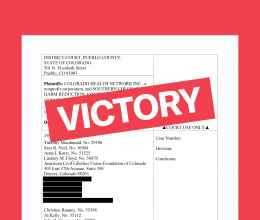ACLU Announces Settlement of Civil Rights Suit Against Denver Police Department
FOR IMMEDIATE RELEASE
November 15, 2000
The American Civil Liberties Union of Colorado (ACLU) announced today that the City and County of Denver has agreed to settle a civil rights lawsuit brought against the police department as a result of a massive police response to a report of a fight at a student dance held at Thomas Jefferson High School (TJ) on May 4, 1996.
In addition to monetary compensation, the agreement commits the police department to several policy initiatives "that will help reduce the likelihood that the unfortunate events at TJ will be repeated," according to Bruce Jones of Holland & Hart, an ACLU volunteer attorney who served as lead counsel in the case along with W. Harold ("Sonny") Flowers, of Hurth, Yeager and Sisk in Boulder.
About 400 metro area young people, most of them African-American, attended the dance, which was sponsored by Brotha 2 Brotha, an organization devoted to developing leadership and citizenship skills in African-American students. As the dance was letting out, an isolated fight at the edge of the parking lot prompted a call to police, to which over 70 officers responded.
The police response prompted a storm of controversy. Witnesses, including parents who were serving as chaperones, reported that police officers used both excessive force (mace, batons, and physical attacks) and racial epithets. The incident, which was one of several crowd control problems experienced by the Denver Police Department in the spring of 1996, led to a special internal investigation ordered by Mayor Webb and a separate investigation by the Public Safety Review Commission.
The ACLU filed the civil rights suit against the City a year later, after first successfully defending four individuals who were arrested at the dance and after filing a separate lawsuit to force disclosure of the police department's internal investigation.
"Although this civil rights lawsuit asserted a variety of legal claims on behalf of Brotha 2 Brotha and the parents and students who attended the dance, a common thread was the allegation that the City was responsible for a pattern of racially discriminatory law enforcement practices," Jones explained. "The City does not agree with that allegation, but it has agreed to changes that both the City and our clients believe will benefit Denver citizens in the years to come." According to Jones, key provisions include the following:
First, in cooperation with ACLU attorneys, the City will develop a written crowd control policy that will be incorporated into the Denver Police Department Operations Manual. Once finalized, the policy will also become part of the Department's training program.
Second, the City has agreed to provide cultural awareness and diversity training (both racial and ethnic) beyond that which was provided at the time of the incident on May 4, 1996. This additional training has already begun, and all new and currently-employed officers will undergo this training by the end of this year.
Third, by June 1, 2001, the City will begin collecting detailed data that will assist in determining the extent to which racial profiling is occurring within the police department. For every traffic or pedestrian stop -- whether a ticket is issued or not -- police will be required to record the race or ethnic background of the individual stopped; the reason for the stop; and such additional details such as whether a ticket was issued, and whether a search was conducted.
"In the last two years, as more and more studies consistently document the fact that racial profiling is a serious problem, dozens of law enforcement agencies across the country have begun systematically collecting the data necessary for critically evaluating the role of race in the many discretionary decisions that patrol officers make on the street," said Mark Silverstein, ACLU Legal Director. "The ACLU commends Denver for agreeing to take the critical first step of collecting data. In the months to come, we will be lobbying the City to go even farther and expressly ban the practice of racial profiling altogether."
Plaintiffs in the lawsuit include Brotha 2 Brotha, its then-Executive Director, Dwight Gentry; two parents, Herman Houston and Gene Roach, and five students who have now graduated from TJ High School: Quentin Jones, Paulnesia Lewis, Lovell Houston, Marcus Houston, and Polica Houston. The settlement agreement will be submitted to the City Council for final approval later this year.

